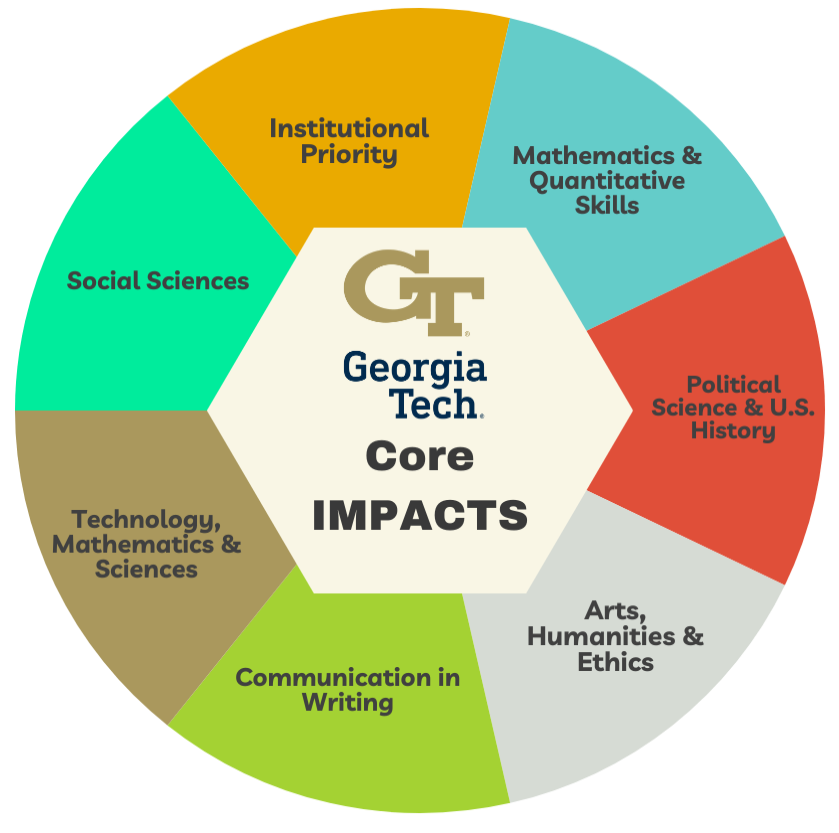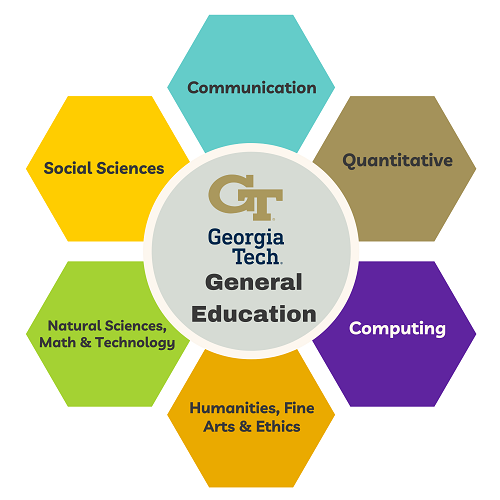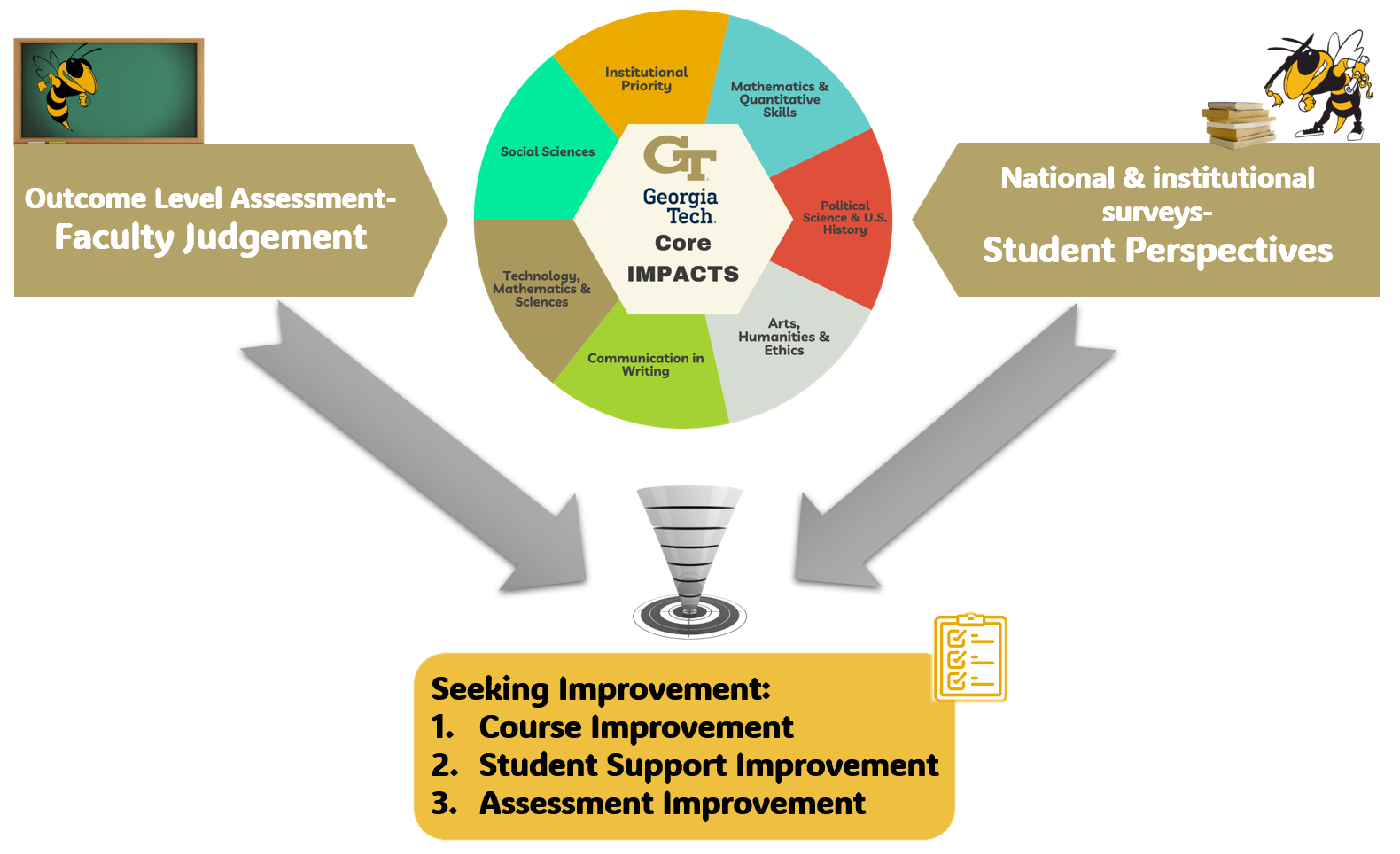General Education Assessment
Core IMPACTS (2024-2025 — Current)
General Education Student Learning Outcomes (Prior to AY 2024-2025)
General Education Assessment Plan
Core IMPACTS (2024-2025 — Current)
Core IMPACTS is a comprehensive general education framework designed to equip students with essential academic and career-ready skills for lifelong success.
Core IMPACTS is structured across seven areas: Institutional Priority; Mathematics and Quantitative Skills; Political Science and U.S. History; Arts, Humanities and Ethics; Communicating in Writing; Technology, Mathematics and Sciences; Social Sciences. Each area provides a key part of students' intellectual, academic, personal, and professional growth.

- Institutional Priority
Students will demonstrate the ability to think critically and solve problems related to academic priorities at their institution.
At Georgia Tech, students will be able to develop solutions to problems involving data and to implement these solutions using an appropriate computer language.
- Mathematics & Quantitative Skills
Students will apply mathematical and computational knowledge to interpret, evaluate, and communicate quantitative information using verbal, numerical, graphical, or symbolic forms.
- Political Science and U.S. History
Students will demonstrate knowledge of the history of the United States, the history of Georgia, and the provisions and principles of the United States Constitution and the Constitution of Georgia.
- Arts, Humanities & Ethics
Students will effectively analyze and interpret the meaning, cultural significance, and ethical implications of literary/philosophical texts in English or other languages or of works in the visual/performing arts.
- Communicating in Writing
Students will communicate effectively in writing, demonstrating clear organization and structure, using appropriate grammar and writing conventions.
Students will appropriately acknowledge the use of materials from original sources.
Students will adapt their written communications to purpose and audience.
Students will analyze and draw informed inferences from written texts.
- Technology, Mathematics & Sciences
Students will use the scientific method and laboratory procedures or mathematical and computational methods to analyze data, solve problems, and explain natural phenomena.
- Social Sciences
Students will effectively analyze the complexity of human behavior, and how historical, economics, political, social, or geographic relationships develop, persist, or change.
General Education Student Learning Outcomes (Prior to AY 2024-2025)
The following learning outcomes were approved by the Institute Undergraduate Curriculum Committee at Georgia Tech and by the USG Council on General Education in April 2011.
 Communication (Area A1)
Communication (Area A1)
Student will demonstrate proficiency in the process of articulating and organizing rhetorical arguments in written, oral, visual, and nonverbal modes, using concrete support and conventional language.- Quantitative (Area A2)
Student will demonstrate the ability to apply basic elements of differential and integral calculus to solve relevant problems. - Computing (Institutional Options Area B)
Student will be able to develop algorithms and implement them using an appropriate computer language and will understand algorithmic complexity and reasonable versus unreasonable algorithms. - Humanities, Fine Arts, and Ethics (Area C)
Student will be able to describe relationships among languages, philosophies, cultures, literature, ethics, or the arts. - Natural Sciences, Math, and Technology (Area D)
Student will be able to demonstrate the ability to obtain, analyze, interpret, and criticize qualitative observations and quantitative measurements to explain natural phenomena and to test hypotheses. - Social Sciences (Area E)
Student will demonstrate the ability to describe the social, political, and economic forces that influence social behavior.
General Education Assessment Plan
For a course to be included in Georgia Tech’s Gen Ed, it must align with the appropriate learning outcome in the Gen Ed proposal process. Courses proposed to be included in Gen Ed undergo approval processes through the Institute’s Undergraduate Curriculum Committee (IUCC), the Vice Provost for Undergraduate Education, the Faculty Senate, and the USG’s Council on General Education.
Nurtured by the IUCC Subcommittee on Gen Ed and Policy, the Gen Ed Assessment Plan outlines the learning outcomes, signature assignments, targets for performance, and results. To encourage a more comprehensive and accurate assessment of student performance, Georgia Tech will use both direct and indirect methods to assess general education learning outcomes.
- General Education Core IMPACTS Assessment plan (full document) (PDF)
- General Education Core IMPACTS Assessment Timeline (PDF)
- General Education Assessment Plan (full document) 2021-2024 (PDF)
- General Education Assessment Timeline 2021-2024 (PDF)
- General Education Assessment Faculty Engagement Plan (PDF)

Direct Assessment
The Georgia Tech Gen Ed Assessment Plan sets the framework for good practice in course delivery and assessment, capitalizing on the good judgement of faculty members regarding students’ levels of attainment of the Gen Ed learning outcomes. Faculty develop signature assignments in their Gen Ed courses, and the assignment, along with student performance, is collected for review and analysis at the end of each semester. These direct measures of student learning via faculty identified signature assignments are at the heart of the Gen Ed Assessment Plan.
Indirect Assessment
Complementing the direct measures will be indirect measures that involve student perceptions of their learning. One indirect measure will be the National Survey of Student Engagement (NSSE). Georgia Tech has participated in the NSSE every three years since 2000 as required by the USG. The survey is administered to all first-year students and seniors. Some NSSE questions align well with Georgia Tech’s Gen Ed learning outcomes. Georgia Tech plans to use the NSSE results to inform our level of expected attainment. Results will be monitored over time and will be triangulated with assessment information from our direct measures.
The second indirect measure will be the Georgia Tech Exit Survey given to graduating seniors. The Institute has been gathering information about students’ experiences for more than fifteen years. Some survey questions address the Gen Ed learning outcomes.
Taken together, the results will be shared with the Subcommittee on Gen Ed and Policy. Using the assessment results, the Subcommittee, along with other stakeholders, consider opportunities for improvement for students’ attainment of the Gen Ed learning outcomes.
General Education Assessment Reports
General Education Core IMPACTS Assessment Reports (2024-2025 — Current)
- Coming Soon
General Education Assessment Reports (Prior to AY 2024-2025)
- Communication (Area A1)
- Quantitative (Area A2)
- Computing (Institutional Options Area B)
- Humanities, Fine Arts, and Ethics (Area C)
- Natural Sciences, Math, and Technology (Area D)
- Social Sciences (Area E)
Subcommittee on General Education and Policy
(Institute Undergraduate Curriculum Committee)
The IUCC's General Education and Undergraduate Policy Subcommittee include campus experts in various areas to ensure appropriate input on agenda items. Matters regarding changes to the Core Curriculum, related assessment issues in collaboration with the Office of Academic Effectiveness, new course proposals, policy changes related to syllabi, affordability, and other undergraduate issues are discussed by this Subcommittee. This Subcommittee operates under the authority of the IUCC and recommends courses and policy changes to the IUCC.
